Peter Delaney got his start as an innovator as a high school student, in the unlikely field of urinal technology. Disgusted by the filthy urinals in a turnpike bathroom, Delaney set out to solve the stubborn problem of urinal backsplash. His answer: the “Pee-flector.”
“I designed a finned device that sent urine down these angled planes instead of back on your pants,” Delaney said. “I was pretty excited about the device and winning a regional entrepreneurship competition, and even got it patented.”
Delaney continued innovating as a student at Washington University in St. Louis. In his four years here, he designed a sustainable emergency medicine curriculum in a country with no ambulances; he launched a successful business that helps health care startups raise capital; and currently he is developing a new software that may revolutionize hospital billing.
“To me, being an innovator isn’t about what you build; it’s about how you think,” said Delaney, who is set to earn his degree in global health and the environment in Arts & Sciences from Washington University in St. Louis on May 18. “I try to bring an innovation mindset to everything I do.”
The trainer
Born in Ireland and raised in Cleveland, Delaney is part of the university’s Honorary Scholars Program, having earned the prestigious Moog Fellowship for Biological Sciences and Chemistry.
Always interested in medicine, Delaney developed a passion for trauma medicine after joining Washington University’s Emergency Support Team (EST), an extremely competitive and demanding program for student first-responders. After completing EST’s rigorous training his freshman year, Delaney went on to earn his certification as a Red Cross first aid/CPR instructor. That’s when a friend told him about Uganda, a country with no ambulances and no 911 notification system.
“You have to rely on friends or bystanders to carry you or to put you on the back of a motorcycle to take you to the hospital,” Delaney said. “That doesn’t bode well for victims of traumatic injury. Studies have shown survival rates fall off dramatically for those who are not treated in what doctors call ‘the golden hour,’ the first hour after a traumatic injury.”
Delaney’s innovative mindset kicked into action. Could he create a first-aid program for lay people in a country with few health care providers and resources? In a wonderful bit of serendipity, Delaney learned that Shanti Parikh, associate professor in anthropology in Arts & Sciences and the faculty fellow in his freshman residence hall, had been conducting research in Uganda for more than 20 years. The more they talked, the more he wanted to test his idea.
With a plane ticket and $4,400 in grant money from the Office of Undergraduate Research and from the Gephardt Institute for Civic and Community Engagement, Delaney set off the summer after his sophomore year for the Ugandan town of Iganga, population 100,000. He hired a research assistant from the local university, Busoga University; interviewed more than 60 residents about their notions of trauma; and analyzed 26 months of injury data from the 58 health care facilities.
His research confirmed what many residents instinctively knew: half of all traffic accidents involved motorcycle taxis the locals call “boda-bodas.” Boda-boda drivers are notoriously reckless, driving too fast for the town’s decrepit roads while carrying up to four passengers on the backseats of their motorcycles.
Confronted with those facts, most of us would call for the government to fix the roads and ticket the drivers. But Delaney came up with a solution as surprising as it was sustainable: Train the boda-boda drivers in first aid.
“There’s a stigma to being a boda-boda driver, and a lot of them would be turned away if they showed up at the emergency room,” Delaney said. “They would say to me, ‘They think that I’m unsafe, but in reality, I’m 50 years old and this is how I feed my family.’ Training them has a way for a lot of these guys to help treat the injury burden created by their associates and improve their standing in their community.”
Delaney developed a five-hour curriculum that taught drivers how to control a scene, stop bleeding, manage airways and breathing, transport victims and splint fractures.
“Often, it’s the simplest interventions that can make the biggest difference,” Delaney said. “You don’t need state-of-the-art technology or a lot of equipment to save someone’s life.”
Delaney supplied every driver with a first-aid kit — a computer bag packed with a reflective vest, gloves, wooden splints, gauze, bandages and another Delaney innovation: a bath towel.
“You can use the towel as a blanket to keep warm someone in shock; roll it up and wrap it around a neck and under the armpits for C-spine immobilization; or use it to lift and carry an injured patient,” Delaney said.
“When you are in a setting without a lot of resources, you have to work with the existing infrastructure and supplies and look for alternatives,” he said. “If you can’t make a program like that sustainable, it will just fall apart when you leave.”
He trained 154 drivers in three months. Two years later, the boda-boda drivers still are practicing the lessons Delaney taught them, and the local government is working to expand the program regionally. In January, Delaney published his research in World Journal of Surgery as first author with a Ugandan collaborator, along with fellow Washington University student Jae Lee (A&S ’16).
This summer, Delaney is collaborating with an international research team that includes Canaan Hancock, a Washington University sophomore in Arts & Sciences, to establish a similar lay first-responder system in Am Timan, Chad. He is also finishing a systematic review of the literature around lay first-responder system development in low- and middle-income countries with physicians from the University of California San Francisco and Boston’s Brigham and Women’s Hospital.
The connector
There’s more: Delaney also is co-founder of Bear Studios, an undergraduate-run business development services firm that offers strategy consulting and design services to early-stage startups and faculty members who want to commercialize novel research.
Since the company’s launch in 2015, Delaney has managed 44 undergraduate student fellows with skills in business, design and technology and has overseen more than 80 projects, more than half in the field of healthcare.
“A lot of scientists and physicians have phenomenal ideas,” he said, “but get so focused on their research that they don’t communicate the other essentials to investors — things a student in Management 100 would learn on the first day, such as assessing a target market, or if there is a market for your technology in the first place.
“We help them craft a narrative that is both cogent and visually compelling,” Delaney said. “Our work has results. So far we have helped raise $300,000 in seed funding.”
Wowed by Delaney’s team, the university’s Skandalaris Center for Interdisciplinary Innovation and Entrepreneurship now provides competitors in its tri-annual LEAP Inventor Challenge the opportunity to work with Bear Studios to develop their ventures. Those who take up the offer often win.
“Everyone benefits,” Delaney said. “We are able to provide students unique experiential learning opportunities, who are then able to help scientists bring their research to market and improve human lives.”
It was during a Bear Studios consultation with a surgeon at Barnes-Jewish Hospital in St. Louis that Delaney came up with his latest innovation — a software platform that may revolutionize hospital billing through artificial intelligence (AI) and natural language processing.
Currently, human coders must flip through a thick book of almost 100,000 five-digit codes to match the procedure noted in a surgeon’s lengthy post-operative note to the corresponding reimbursement code. The process is as inefficient as it is flawed. In some hospitals, the error rate tops 40 percent.
“This is a problem that just screamed, ‘AI, AI, AI,’” Delaney said. “So now we’re developing a software that uses natural language processing to recognize textual patterns and identify text that indicates a certain code and then applies that code to post-operative notes automatically.” The company is called OpCoder AI.
His technical co-founder is his roommate William Luer, who also will graduate this May with a masters degree in computer science from the School of Engineering & Applied Science. Together, they are applying for grants through the Discovery Competition, which is funded through the School of Engineering & Applied Science; Global Impact Awards, which is funded through the Skandalaris Center; and Arch Grants, which is funded by a not-for-profit corporation that supports local entrepreneurs.
Beyond that, medical school is still on the horizon. Delaney will be graduating cum laude from the College of Arts & Sciences and after that intends to apply to medical schools, including Washington University School of Medicine in St. Louis.
“This community has an innovation mindset,” Delaney said. “I like that.”
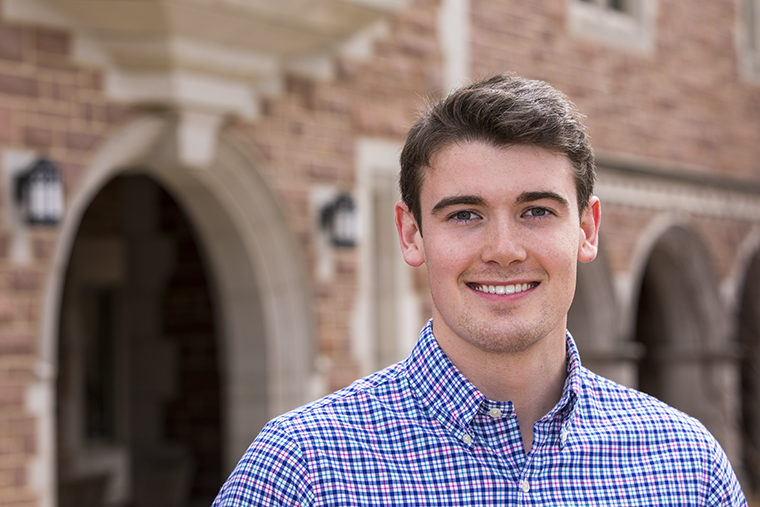
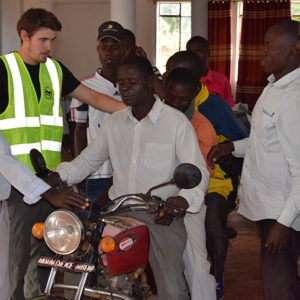
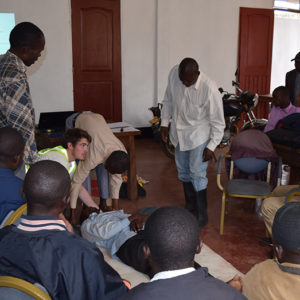
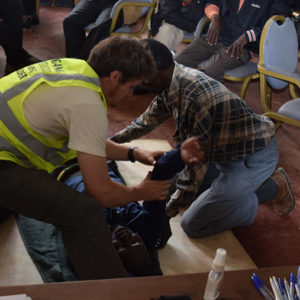
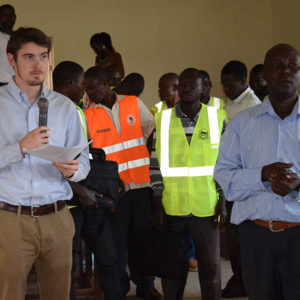
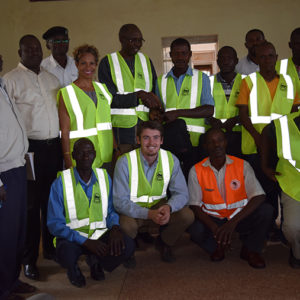
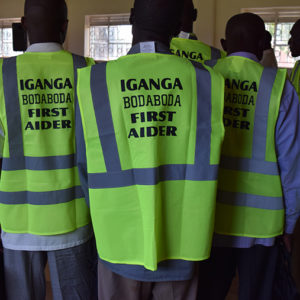
Comments and respectful dialogue are encouraged, but content will be moderated. Please, no personal attacks, obscenity or profanity, selling of commercial products, or endorsements of political candidates or positions. We reserve the right to remove any inappropriate comments. We also cannot address individual medical concerns or provide medical advice in this forum.